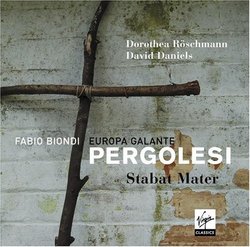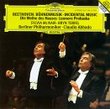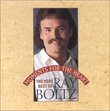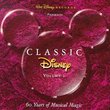| All Artists: Giovanni Pergolesi, Fabio Biondi, David Daniels, Europa Galante, Dorothea Röschmann Title: Pergolesi: Stabat Mater Members Wishing: 1 Total Copies: 0 Label: Virgin Classics Original Release Date: 1/1/2006 Re-Release Date: 11/14/2006 Genres: Special Interest, Pop, Classical Styles: Vocal Pop, Opera & Classical Vocal, Historical Periods, Baroque (c.1600-1750) Number of Discs: 1 SwapaCD Credits: 1 UPC: 094636334028 |
Search - Giovanni Pergolesi, Fabio Biondi, David Daniels :: Pergolesi: Stabat Mater
 | Giovanni Pergolesi, Fabio Biondi, David Daniels Pergolesi: Stabat Mater Genres: Special Interest, Pop, Classical
The market is loaded with recordings of Pergolesi's beautiful, graceful "Stabat Mater" and there are also plenty of versions of both "Salve Regina" selections to choose from. The young Pergolesi, who died at age 26, had a ... more » |
Larger Image |
CD DetailsSynopsis
Amazon.com The market is loaded with recordings of Pergolesi's beautiful, graceful "Stabat Mater" and there are also plenty of versions of both "Salve Regina" selections to choose from. The young Pergolesi, who died at age 26, had a flair for the theater and the "Stabat Mater" was often accused of being too operatic. Fabio Biondi presents it (and the other two pieces) without much sentimentality and he uses a vastly reduced orchestra--a mere three violins, viola, cello, double bass, and theorbo (and organ)--which brings the stark religiosity to the forefront. That is not to say that these pieces aren't sensual as well; soprano Dorothea Röschmann's mesmerizing, warm tone and David Daniel's flawless, forwardly placed countertenor are lush enough to create drama of their own. And Biondi chooses tempi that are quick enough to give each movement thrust while lingering on Pergolesi's dissonances effectively. The two "Salve Regina" selections are scored for one voice each and each soloist shines brightly. Among the many versions of these works, this new set stands out. --Robert Levine Similarly Requested CDs
|
CD ReviewsPergolesi's Dramatic Take on Mournful Hymns Brought to Vivid Ed Uyeshima | San Francisco, CA USA | 11/15/2006 (5 out of 5 stars) "Baroque specialist Fabio Biondi masterfully leads his stellar ensemble Europa Galante on another wondrous recording, this time for another take on Giovanni Battista Pergolesi's "Stabat Mater" (one of many on the market) and two versions of his similarly devout "Salve Regina". There have also been a number of versions of the "Stabat Mater" from a variety of renowned Baroque composers, and in fact, Pergolesi's 1736 work was written specifically to replace an older piece by Alessandro Scarlatti, which had been deemed antiquated by that time. Even though Antonio Vivaldi's 1712 version is probably the most famous of the hymn, Pergolesi engendered controversy at the time by lending a more contemporary feeling to what is truly an inspirational poem that had been part of Catholic liturgy. A sort of James Dean of his generation, the composer broke existing rules by introducing elements of opera boffo, which offended religious purists, and then ensuring his legend by dying at age of 26 of consumption just as he completed the piece. What elevates this recording to the top of the heap is the world-class vocal talent Biondi recruited, German soprano Dorothea Röschmann and American countertenor David Daniels (with whom Biondi worked on a magnificent 2002 disc of Vivaldi's "Stabat Mater"). Both well versed in the early music genre, they use their extensive interpretative skills on what is essentially a meditation on Mary's suffering during Jesus' crucifixion. Having worked together almost a decade earlier as Drusilla and Nerone in the Bayerische Staatsoper production of Monteverdi's "L'incoronazione di Poppea", Röschmann and Daniels manage to overcome the lyrical complexities and blend lusciously with whatever vocal disparities disappearing almost completely. Daniels' superior talent in phrasing and diction comes across on the thirteen-minute F-minor version of the "Salve Regina". His shimmering tone brings all the drama Pergolesi intended in realizing the hopeful aspiration of the prayer. If Röschmann is slightly less stellar on the eleven-minute A-minor version, it is simply that she doesn't quite have Daniels's innate theatricality. The accompaniment by Europa Galante is expert and often stunning, though I think the pervasively somber tone could have benefited from a fuller orchestra at times. There are also some moments when the voices and instruments are not blending as much as I would have liked, but these are relatively minor quibbles. This disc is strongly recommended for early music followers and those who wish to hear Röschmann and especially Daniels in peak form." Such an amazing performance!! David Greco | 08/27/2007 (5 out of 5 stars) " A short review to say that I have many recordings of the work, and by far this is my favourite for the steller levels of drama, passion, nuance and musicianship brought to the music by this GREAT baroque orchestra under Biondi, and by the two amazing singers Daniels and Roeschmann...what a team! 5 Stars." The only choice! Giordano Bruno | Wherever I am, I am. | 04/17/2007 (5 out of 5 stars) "Levine's review above says that this performance "stands out". I'd say it stands alone. I have nothing to add to previous reviews except my personal recommendation and a warning: avoid the DVD available of the Stabat Mater at all costs. It's in the style affectionately known as "bellow canto"."
|

 Track Listings (21) - Disc #1
Track Listings (21) - Disc #1








